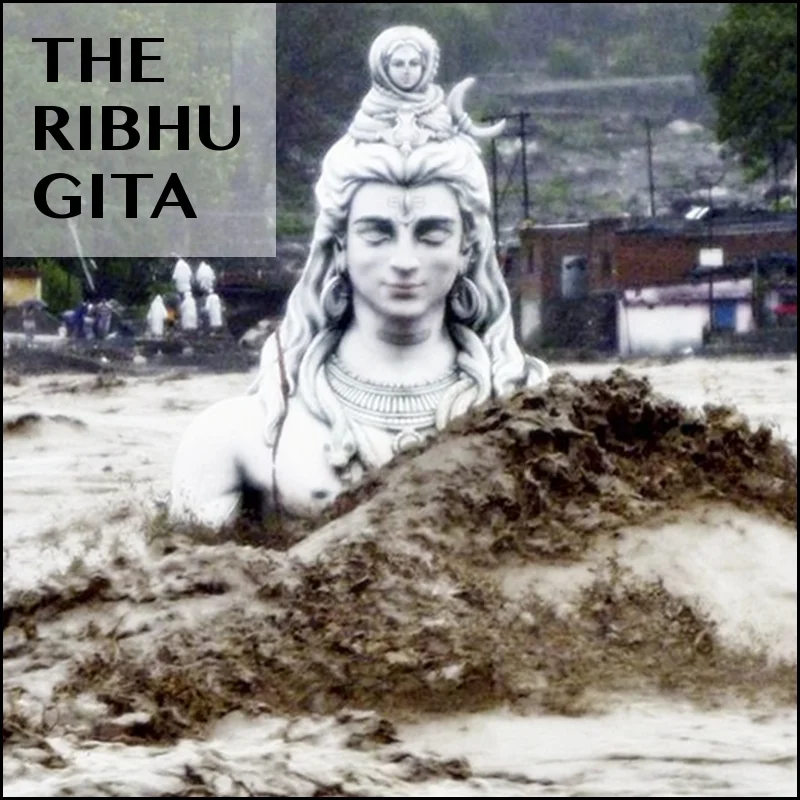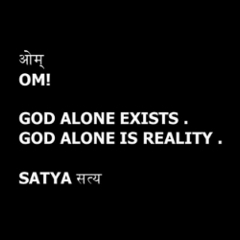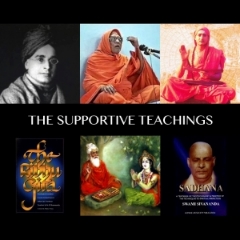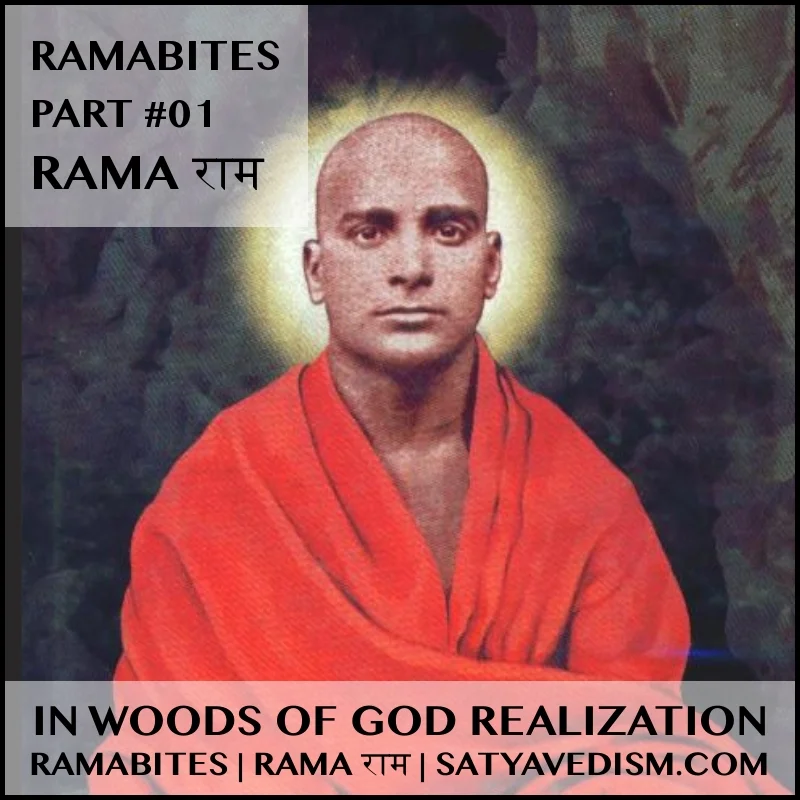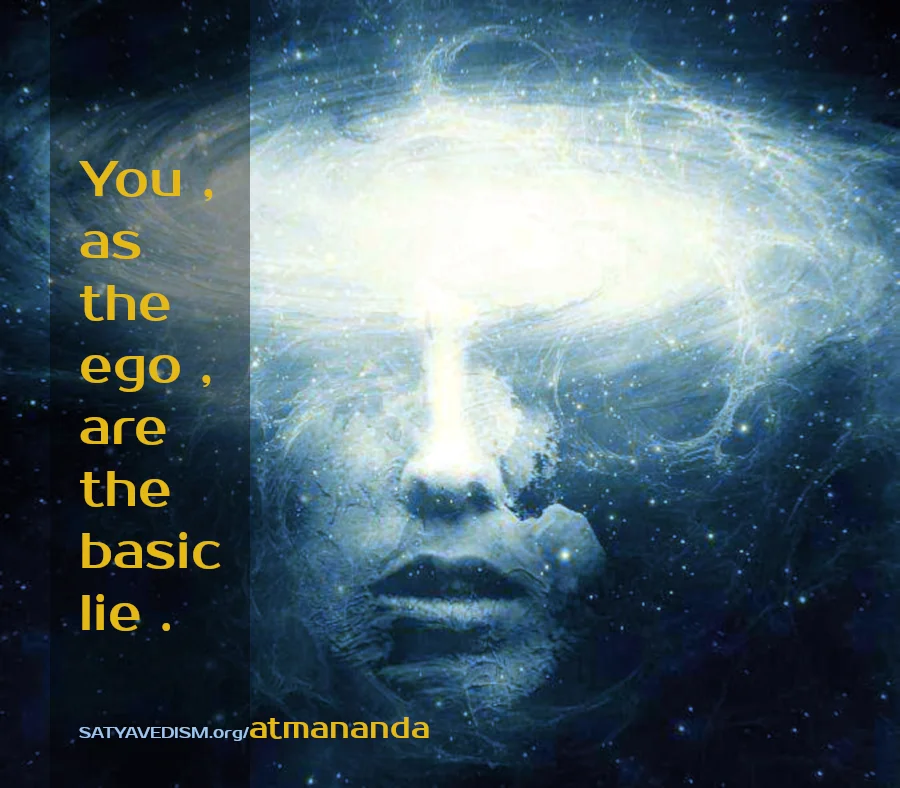RIBHU GITA | INTRO | SEL026 TO SEL051
| | homeRIBHU GITA | CHAPTER 4 | SEL001 TO SEL051
|| 00 | INTRODUCTION BY MASTER NOME ||
RIBHU GITA | INTRODUCTION | SEL026
Brahman alone is present .
Indeed , Brahman alone is present , and there has never been even a single , objective thing .
Nothing has been created .
The Absolute , formless and homogeneous and limitless , admits to nothing outside it and nothing inside it . It is as it is , always .
RIBHU GITA | INTRODUCTION | SEL027
A disciple said to Ramana Maharshi , " Ribhu Gita speaks of so many objects as unreal , adding at the end that they are all Brahman and thus real " .
The Maharshi replied ,
" Yes , when you see them as so many , they are asat , ie unreal ; whereas when you see them as Brahman , they are real , deriving their reality from their substratum , Brahman " .
RIBHU GITA | INTRODUCTION | SEL028
Later in this same dialogue the disciple asked , " Viveka is said to be discrimination between the Self and the non-Self . What is the non-Self ? "
Ramana Maharshi , full of Grace and Supreme Knowledge , replied ,
" There is no non-Self , in fact . The non-Self also exists in the Self .
It is the Self which speaks of the non-Self because it has forgotten itself . Having lost hold of itself , it conceives something as non-Self , which , after all , is nothing but itself " .
RIBHU GITA | INTRODUCTION | SEL029
In the Ribhu Gita , the sage negates all that is worldly and samsaric .
Ribhu also negates all concepts regarding what is spiritual such as various forms of worship , practice , meditation , the gods , and even names given to the Absolute and the Realized state .
In many instances , Ribhu redefines the meaning of some form to elucidate its profound spiritual significance .
RIBHU GITA | INTRODUCTION | SEL030
Ramana Maharshi has graciously commented abundantly upon this .
In Letters From Sri Ramanasramam , we read ,
" Bhagavan got that book ( Ribhu Gita ) , read it , and told us the following :
' O Lord ! I went all around the world to do pradakshina ( circumambulation ) to you , but you are in fullness everywhere .
How then can I contemplate a second ?
I shall worship you as " katashta akhila rupa " ( immovable , entire form of the world ) .
( Alternative translation : the immovable and immutable that is the entire form of the world . )
That is the only pradakshina to you . '
RIBHU GITA | INTRODUCTION | SEL031
Namaskar also means the same thing .
The merging of the mind in the Self is namaskar , and not the mere act of prostrating whenever you get up or sit down , or whenever you go that side or come this side . "
RIBHU GITA | INTRODUCTION | SEL032
In Day by Day with Bhagavan , we read , " The proper pradakshina is going round the Self or , more accurately , to realize we are the Self and that within us all the countless spheres revolve , going round and round , as described in the following stanza of the Ribhu Gita , Tamil version ( Chapter 3 Verse 39 ) :
Reflecting , " I am the all-blissful Self "
Is worship as with words and flowers .
True circumambulation is the thought
" In ME the million universes roll " ;
One who knows all beings bow to One
And One to none ,
One bows before the Mahalinga-Self .
RIBHU GITA | INTRODUCTION | SEL033
In Talks with Sri Ramana Maharshi , the Maharshi again references Ribhu , saying ,
" Says the Ribhu Gita ,
' I remain fixed , whereas innumerable universes , becoming concepts within my mind , rotate within me . This meditation is the highest pradakshina ( circumambulation ) . ' "
RIBHU GITA | INTRODUCTION | SEL034
In the passage from Day By Day with Bhagavan , cited above , Ramana Maharshi proceeds to clearly explain the relation of the wise to the forms of spiritual practice and worship , while alluding to the same instruction contained in the Ribhu Gita :
" The jnani , though knowing that meditation on the Self is the best worship , will join in all the other kinds of worship for the good of others and as an example to them .
In fact , the jnani may observe all the other ways even more correctly and steadfastly than those who follow only those paths and know nothing of jnana .
That is referred to in the following verse , also occurring in Ribhu Gita . The gist is , ' If the Guru refers to dvaita ( duality ) when teaching advaita ( non-duality ) to the disciple , it is not to be regarded as the Guru's real teaching any more than one should regard as real the grief of one who weeps because one is paid to do so . ' "
RIBHU GITA | INTRODUCTION | SEL035
In all cases when Ribhu seems to negate the Absolute itself , with phrases declaring the nonexistence of Liberation , Knowledge , the Self , Brahman , and so forth and so on , it is not the existence of the Absolute that is negated , but rather notions regarding these .
The Absolute can never be an object of thought .
Indeed , it is in freedom from thought entirely that one truly knows the Absolute as it truly is .
In Self-Realization , which is the Realization of the Absolute , Consciousness knows itself , by itself , in itself . Here , knowing is Being .
RIBHU GITA | INTRODUCTION | SEL036
Relinquishing the idea of " the Self " , the Self knows itself .
This Knowledge is continuous , and that which is continuous is eternal .
RIBHU GITA | INTRODUCTION | SEL037
Being-Consciousness is never interrupted and is indestructible and ever existent .
Whatever thought may appear , be it gross or subtle , very deluded or lofty , it fails as a definition for the Self or as Knowledge of Reality .
To abide free of misidentification with any thought , having ceased the superimposition of the sense of " reality " , of identity , and of happiness upon any of them , is to realize true Knowledge .
It is this nonconceptual , real state of pure Being that is referred to by " the Self " , " Realization " , " Brahman " , " Siva " , and such other terms indicative of the Absolute .
RIBHU GITA | INTRODUCTION | SEL038
It should also be mentioned that the abandonment of the idea of " Liberation " presupposes the previous complete elimination of all ideas of ignorance .
The release of any thought of " nonduality " presupposes the previous utter destruction of dualism without a trace of it remaining .
The relinquishment of the thought of " Brahman " assumes the previous attainment of the understanding that all that is not Brahman is utterly unreal .
RIBHU GITA | INTRODUCTION | SEL039
What has just been stated regarding references to terms applicable to the Absolute is also true regarding all the negations in Ribhu Gita of various spiritual practices .
Only the one who abides in perpetual meditation and who has attained that steadiness of abidance in which there is no possibility of nonmeditation is capable of relinquishing " meditation " — that is , every notion of differentiation regarding it — in the way that Ribhu intends .
RIBHU GITA | INTRODUCTION | SEL040
Similarly , it is the one who has deeply inquired into the nature of the Self or who has utterly surrendered , reaching the apex of devotion , or who has thoroughly renounced all worldliness who can release all of these .
RIBHU GITA | INTRODUCTION | SEL041
In other words , one liberates oneself from what is dualistic prior to releasing an idea concerning nonduality ; what is lower , before stepping beyond what is higher .
RIBHU GITA | INTRODUCTION | SEL042
In a similar way , to truly stand free of the mind , one first stands free of the body , which is but an appearance in the mind ; or the freedom from the mind must include freedom from the body .
RIBHU GITA | INTRODUCTION | SEL043
Moreover , the Reality of the Absolute transcends even the subtlest and loftiest of ideas .
Therefore , Silence is most eloquent in teaching about it .
Ribhu employs instruction by negation to cause one to abide in transcendent Silence .
RIBHU GITA | INTRODUCTION | SEL044
The declarations affirming the reality of " the Self " , " Brahman " , " Siva " , and such , also serve the same purpose for those who truly hear .
Abidance in the Silence of the Self is being as you really are . Spiritual practice is the endeavor to be as you really are .
RIBHU GITA | INTRODUCTION | SEL045
The essence is true and forever beyond notions and their negation .
Thus the negation of what is spiritual in the Ribhu Gita is always the destruction of notions regarding such and not the disregarding of the essential experience , be it of practice or Realization .
RIBHU GITA | INTRODUCTION | SEL046
Again and again , Ribhu explains the true nature of the Self , the real significance of < I > .
Again and again , Ribhu explains the truth about Brahman .
The descriptions are of identical meaning . The real meaning of the Mahavakya-s such as
" That you are " ,
" Consciousness ( or Supreme Knowledge ) is Brahman " ,
" This Self is Brahman " , and " I am Brahman "
is brought forth in this Ribhu Gita , again and again .
RIBHU GITA | INTRODUCTION | SEL047
The meaning is to be experientially realized by the removal of every concept about Brahman , or That , and by liberating oneself of every misidentification and sankalpa about oneself .
If the Self be realized as it is , it Itself is That which is called Brahman ; and this entire Ribhu Gita is then seen as description of one's own Self .
The purpose of this Gita is the removal of all false notions — the awakening from the dreamlike illusions of all that is unreal — and the Realization of That which alone is , always .
RIBHU GITA | INTRODUCTION | SEL048
As is enumerated in Chapter 38 , this Ribhu Gita is the quintessence of all essences .
The reading itself , as a meditation , is a kind of sadhana , or spiritual practice , as Ramana Maharshi has indicated , and as the Gita itself declares .
One should not simply read , but feel beyond all feeling the Truth of what is stated herein .
Dive within and realize how true the Truth truly is .
RIBHU GITA | INTRODUCTION | SEL049
Even with the eyes open reading this sacred text , inwardly inquire into the Self , and understand this exquisite description of your own ineffable nature .
Regardless of one's initial comprehension , even the simple seeing or hearing , again and again , of this precious spiritual instruction will bring about great spiritual benefit .
RIBHU GITA | INTRODUCTION | SEL050
" Once Bhagavan Sri Ramana presented Sampurnamma a copy of Ribhu Gita and asked that the book be studied .
When Sampurnamma wanted to be excused on the ground of not understanding a word of it , Sri Bhagavan persisted and asked that it be read all the same :
' It does not matter that you do not understand . '
' Still , it will be of benefit to you . ' "
RIBHU GITA | INTRODUCTION | SEL051
May they who read this sacred scripture , Ribhu Gita , realize the nondual Truth and , being free from even the least trace of delusion , blissfully abide as THE ONE ABSOLUTE .
SOURCE | SATYAVEDISM.ORG

